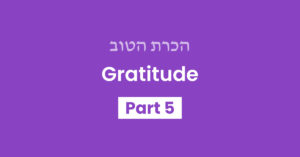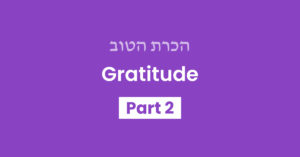Last week, we practiced tracing everything back to its source. When we train ourselves to look at this world and wonder where everything came from, then we will ultimately be able to trace the world back to its Creator – Hashem. We will come to recognize Hashem as our Creator and thank Him for everything He gives us, which fulfills the purpose of our creation.
When you look at your apple and think of all the people involved in bringing this fruit to you (the farmer, the man driving the delivery truck, the storekeeper, etc.) you may start to wonder:
Do I really need to thank all these people?! They didn’t do all their work in order to benefit me – they don’t even know I exist! They do the same job every day, and they’re not thinking about me at all… they’re just working in order to get paid. Do I really need to thank them?
Am I supposed to feel appreciation even for someone who does things for his own benefit, without having me personally in mind at all?
Am I supposed to feel appreciation even for someone who does things for his own benefit, without having me personally in mind at all?
As we saw in the answers to last week’s Trivia questions, the answer is a resounding YES!
Moshe Rabbeinu taught us this lesson when he asked Aharon to strike the water and the earth to bring about the plagues of Blood and Lice, instead of Moshe doing it himself. Why couldn’t Moshe strike the water and the earth by himself?
The Midrash1 explains that Moshe felt a debt of gratitude to both the water and the earth, and therefore he could not strike them. The water hid Moshe when he was a baby (Shemos 2:3) and the earth saved Moshe by hiding the evil Egyptian whom Moshe had to kill in order to save a fellow Jew (Shemos 2:12). Hashem told Moshe that he cannot hit the water and the earth by himself, because if he would, it would demonstrate a lack of appreciation for these natural elements that saved him from death. That’s why Moshe had to ask Aharon to hit the water and earth instead.
We can see from this Midrash that a person is indeed required to demonstrate appreciation even to inanimate objects.
A person is indeed required to demonstrate appreciation even to inanimate objects.
In a similar vein, the Talmud2 teaches:
“If you drank from a pit, do not throw a rock into it.”
You benefitted from the pit, so don’t throw something into it.
The Reason for Appreciating Inanimate Objects
Why do we need to demonstrate appreciation for inanimate objects, which have no thoughts or feelings at all? They’ll never know the different if we appreciate them or not!
Rav Dessler3 explains: When we express appreciation, the main point is to develop ourselves into thankful people, not just to make the other person feel good for being appreciated. It is irrelevant whether the person who helped us had in mind to benefit us personally or not; no matter what the other person was thinking, we need to develop ourselves in people who notice the gifts around us and appreciate where they came from.
That’s why Chazal (the Sages) have taught us to demonstrate appreciation even to inanimate objects, who certainly do have not have intention in mind to help us, because Chazal are teaching us that the chiyuv of hakras hatov is not dependent on the intention of the giver at all. Rather, the obligation to express appreciation is an obligation that rests on you, the receiver of the benefit.
A person who receives a gift should feel a debt of gratitude for the mere fact that he received something, but he should not start wondering and analyzing whether the giver intended to benefit him or not. No matter what intention the giver had in mind, we are still obligated to feel appreciation for however they benefitted us.
So do we have to appreciate the farmer, the man driving the delivery truck and the shopkeeper, who were all involved in bring us this delicious apple? The answer is: YES, we do! Because it develops us into thankful people.
Sources: [1] Midrash Tanchuma Va’eira 14; [2] Bava Kama 92b; [3] Strive for Truth Vol. III. pgs. 98-99, also see Zichron Meir by Rav Meir Rubman pg. 335.
Your Challenge
To do every day this week, once a day:
Say “Thank you” to someone who helped you or gave you enjoyment, but choose someone who was doing it anyway, without specifically having you in mind.
FOR EXAMPLE:
- Write a “Letter to the Editor” thanking them for a magazine you enjoy reading.
- Thank the janitor in your school or workplace.
- Thank the mailman for delivering your mail.
- Call or email a company to say thank you for creating an item that benefits you – such as the company that created your fridge, computer, favorite pens, etc.
If it is hard to reach the person or company, you can just say your “thank you” out loud, by saying, for example: “I appreciate the people who plow the snow on my street so that I can walk and drive safely.”
Torah Questions
- Which person in the Chumash is known as the first person to thank Hashem, and what did they thank Hashem for?
- Where in Shabbos davening do we say: “Wow, Hashem, You have done so many great things for us…. we can NEVER repay You for all your kindnesses!!”
- What passuk do we say in Hallel that means: “How can I ever repay Hashem for all His kindnesses to me?”
- Which song in the Pesach Haggadah recounts a long list of many kindnesses that Hashem did for us, and emphasizes that each one of these kindnesses ALONE would be enough that we would be obligated to thank Hashem for even just that ONE kindness?
- When Hashem gave Moshe Rabbeinu his mission to take the Jewish people out of Egypt, Moshe did not leave right away. Moshe felt a debt of gratitude to someone and therefore had to ask this person for permission first, before leaving for Egypt. From whom did Moshe go to ask permission to leave? (Hint: See Shemos Perek 4 and Shemos Rabbah 4:2)
- The Midrash Shochar Tov (Mizmor 56) says that after Moshiach comes, we will no longer bring any korbanos (sacrifices)… except for one. Which sacrifice will we still bring?
Questions to Ponder
- There are many times in Tanach – and in Jewish history in general – where people have bowed down to demonstrate their gratitude to another person. Why do you think bowing down is a proper way to express gratitude? Why not move the body in a different way?
- On a related note… why do you think we sometimes bow down as we say the word “Baruch” in “Baruch Atah Hashem”? (The answer may be related to next week’s insight!)
- Why do you think we sometimes feel uncomfortable expressing appreciation to people? What thoughts or feelings hold us back from saying “thank you”?
- Tosfos in the Talmud Yerushalmi speaks of a certain plant which has an interesting nature: As long as the plant is connected to the mother plant from which it draws sustenance, its leaves are turned away from the mother plant. But as soon as the child plant detaches from the mother plant, the leaves turn to face the mother plant. What lesson does this teach us about hakaras hatov?





